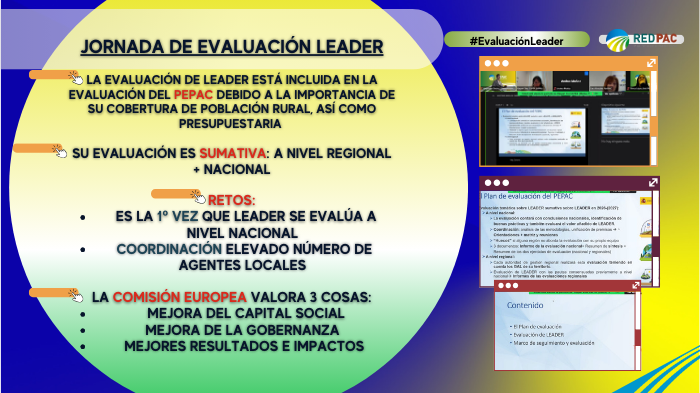
22 de October de 2024
Dinamización rural
• The day aimed to provide training and technical support to all stakeholders involved in the LEADER approach and to present the evaluation of LEADER in this period of the CAP.
For this programming period of the Common Agricultural Policy, CAP 23-27 , Community regulations provide that, depending on the evaluation needs , Member States will assess the possibility of evaluating certain specific themes such as LEADER . In the case of Spain, the evaluation of LEADER is included in the PEPAC Evaluation Plan , ( Spain's Strategic Plan for the CAP 2023-2027 ), due to the importance of the LEADER approach in promoting the objectives of the PEPAC, both in budgetary terms and in terms of the rural population covered by this initiative.
Furthermore, in all the surveys carried out by the Ministry of Agriculture, Fisheries and Food ( MAPA ) to the different territorial agents (Local Action Groups, national and regional networks, regional management authorities and PEPAC Management Authority, LEADER managers and evaluators) the results collected made clear the need for training in LEADER issues and their evaluation.
Hence, the CAP Network organized the "LEADER Evaluation Workshop" in a virtual format, bringing together 210 attendees. The workshop aimed to provide training and technical support to all stakeholders involved in the LEADER evaluation, as well as to ensure their participation in the design of the LEADER evaluation. The workshop also served as an opportunity for the PEPAC Managing Authority and its evaluation team to present a proposal on how LEADER will be evaluated during this CAP period.
LEADER Evaluation
Due to the territorial diversity that exists in Spain, the PEPAC contemplates that the evaluation on LEADER be summative , which implies that evaluations will be carried out at the regional and national levels.
This evaluation is challenging for several reasons:
• This will be the first time that LEADER is evaluated at the national level. Therefore, the guidelines of the " Technical Helpdesk for the European Evaluation of the CAP " are essential , as they served as the basis for the proposed design of the national evaluation.
• There is a high number and diversity of agents involved in the evaluation of LEADER that must be coordinated so that their Participatory Local Development Strategies (PLDS) are the best for the country's rural development.
Program of the day
The event was designed to demonstrate how the LEADER added value assessment is intended to be carried out, taking into account the specificities and distribution of responsibilities in our region, by adapting the documents provided by the European Union to the Spanish reality. This included a forum for exchanges so that contributions could be made to the proposal and where best practices in LEADER assessment were disseminated, with the participation of Catalonia.
The structure of the day was as follows:
• General context of the LEADER evaluation
• Experience of the autonomous community of Catalonia in the LEADER evaluation
• Participatory dynamics : improved social capital, improved governance, and better results and impacts
• Presentation of main ideas and conclusions
All documentation generated by the event will be included in its corresponding space . The recording of the event will also be broadcast on the PAC Network's YouTube channel.









